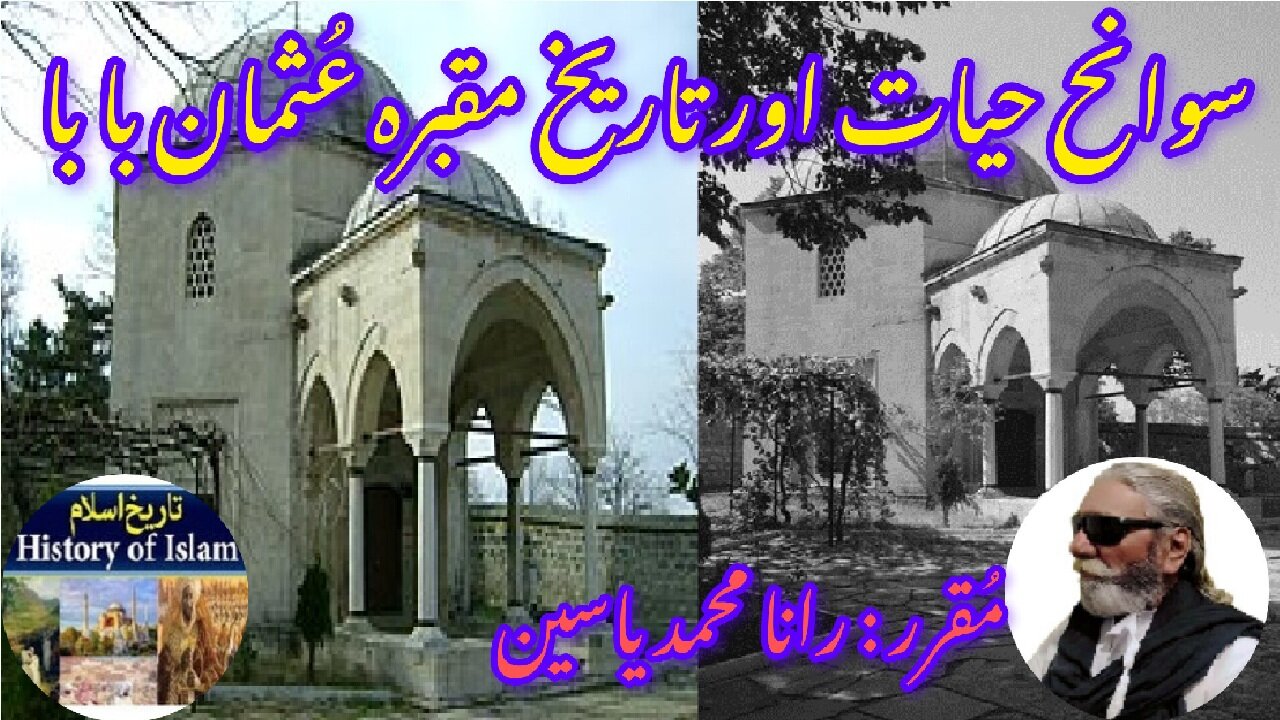Premium Only Content

Osman Baba and his shrine | उस्मान बाबा और उनकी दरगाह | عثمان بابا کی سوانح حیات اور مزار کی تاریخ
@islamichistory813 #Otmanbaba #sufisaint #culturalheritage #biography #islamicmysticism #islamicphilosophy #shrine #historicalfigures
Biography of Otman Baba and the history of his shrine
Dekhti Aankhooon aur sountay kaanoon ko Asslamoalaikum, sisters, brothers friends and elders, in informative series videos of Islamic ascolars, sufisaints, cultural heritages, islamic philosophys, islamic mysticisms and historical figures. today we are describing biography of Otman Baba and the history of his shrine.
Otman Baba, a prominent 15th-century dervish, is remembered as one of the most revered Sufi figures in the history of the Ottoman Empire. Born around 1378, Otman Baba was a deeply spiritual man who devoted much of his life to the Sufi path of asceticism, seeking a closer connection with God through travel, prayer, and meditation. Though his early life remains shrouded in mystery, his later years were marked by his extensive travels throughout the Ottoman Empire, during which he became a highly respected and influential figure, particularly among the Muslim communities of Bulgaria. It was during these travels, beginning in the mid-15th century, that he gained a significant following, particularly in Bulgaria, where his teachings and spiritual practices left a lasting mark on the region. His connection with the Bulgarian people, and especially his efforts to spread the Sufi path of love, humility, and devotion, led to his veneration as a saint in the area after his death.
Otman Baba's travels through the Ottoman Empire were not just pilgrimages in the traditional sense but also journeys of spiritual discovery and connection. He traveled with the intention of spreading the mystical teachings of Sufism, which emphasize the purification of the soul and the cultivation of love and compassion toward others. He was known for his deep spiritual insight, his simple yet profound lifestyle, and his ability to connect with people from all walks of life. As he moved through the empire, Otman Baba was drawn to the diverse cultures and peoples he encountered, particularly in the regions that were then part of the Ottoman territories, including Bulgaria. By the time he reached Bulgaria around 1445, Otman Baba had already built a reputation as a wise and compassionate mystic, and his message resonated strongly with the local Muslim populations.
In Bulgaria, Otman Baba’s spiritual teachings and practices had a transformative effect on the local Muslim communities, particularly among those who were already inclined toward Sufism. His influence grew steadily, and he was soon considered a spiritual guide and a leader of the dervish community. His sermons and teachings focused on the idea of the unity of all creation and the importance of transcending worldly attachments to attain spiritual enlightenment. He emphasized humility, selflessness, and devotion to God, which attracted many followers who were looking for deeper meaning in their lives. Over time, Otman Baba’s reputation grew, and he became an important figure in the Sufi tradition of the region. His appeal was not confined to religious elites or scholars, but extended to ordinary people who were drawn to his sincere spirituality and his deep commitment to service and care for the community.
After Otman Baba's death on the 8th of Receb in 1478, his followers, who had come to revere him as a saint, sought to honor his memory and continue his teachings. A pilgrimage complex grew around his grave, which became a center of veneration and spiritual practice. The site, located in the present-day Bulgarian village of Teketo, soon became a place of pilgrimage, where people would come to pay their respects to the saint and seek spiritual guidance. The shrine of Otman Baba in Teketo became known for its serene and peaceful atmosphere, and it attracted a steady stream of visitors, both locals and pilgrims from other regions, who sought blessings and healing. The pilgrimage site was not only a physical location of spiritual significance but also a center for the continuation of Otman Baba’s teachings. It became a place for communal gatherings, prayers, and reflection on the deeper meanings of Sufism and Islam.
During the era of communism in Bulgaria, which saw the suppression of religious practices, Otman Baba’s shrine underwent significant changes. In an effort to control religious expression, the Bulgarian government transformed the shrine into a museum. While this action was part of the broader secularization policies of the communist regime, it also played a role in preserving the site for future generations. Despite the political and religious restrictions of the time, the shrine continued to attract visitors, many of whom still considered it a sacred place. The museum’s role in safeguarding the physical integrity of the site ensured that the memory of Otman Baba would not be forgotten, even in the face of ideological opposition.
The shrine of Otman Baba remains a significant site for those who seek to honor his legacy and to connect with the spiritual heritage of the Ottoman Empire. Today, it continues to be a symbol of the enduring power of Sufi spirituality in the region and a reminder of Otman Baba’s life of devotion, humility, and love. The complex surrounding his tomb in Teketo has been preserved and maintained, offering visitors a place to reflect, meditate, and pray. It stands as a testament to the lasting influence of a man who devoted his life to spiritual service and who, through his travels and teachings, left an indelible mark on the spiritual landscape of the Ottoman Empire and the Balkans.
The shrine and the surrounding area have become not just a place of pilgrimage, but also a cultural and historical landmark. Visitors from Bulgaria, Turkey, and beyond continue to come to Teketo to learn more about Otman Baba’s life and his contributions to Sufi mysticism. His story serves as an inspiration to those who seek to live a life of spiritual purity and service to others, as well as a reminder of the deep spiritual connections that transcend national and cultural boundaries. The veneration of Otman Baba as a saint and the continued pilgrimage to his shrine affirm the enduring relevance of his teachings, and his legacy as a beloved figure in the spiritual history of the region remains strong.
With this, we seek your permission until tomorrow, tomorrow we will describe the biography of Owais al-Qarani and the history of his Shrine.
========================
-
 13:26
13:26
ISLAMIC HISTORY
1 day agoIslamic History Episode 241 The Dethronement and Death of Mu'taz Billah معتز بلہ کی معزولی اور وفات
61 -
 LIVE
LIVE
Rebel News
53 minutes agoTruth & Reconciliation Day, Poilievre on anti-Christian hate, No new immigration | Rebel Roundup
370 watching -
 LIVE
LIVE
TheAlecLaceShow
1 hour agoHegseth Calls Out FAT Generals | Schumer Shutdown | Charlie Kirk Conspiracy’s | The Alec Lace Show
83 watching -
 LIVE
LIVE
LFA TV
14 hours agoBREAKING NEWS ALL DAY! | TUESDAY 9/30/25
3,380 watching -
 1:06:46
1:06:46
The Rubin Report
2 hours agoListen to ‘The View’ Crowd Gasp as Whoopi Doubles Down on Extremist Rhetoric
133K71 -
 1:16
1:16
Steven Crowder
2 hours agoI'm Back
124K555 -
 LIVE
LIVE
The Shannon Joy Show
3 hours agoWWE DC! Chuck The Cuck Schumer Takes On Fat Boy Trump In A Budget Battle. Live W/ David Knight
278 watching -
 33:49
33:49
Grant Stinchfield
1 hour agoThe Shocking Charts That Change Everything About What you Thought About Vaccines!
4.42K2 -
 1:01:24
1:01:24
VINCE
4 hours agoDemocrats Can't Keep This Sex Criminal Locked Up | Episode 136 - 09/30/25
244K245 -
 1:59:05
1:59:05
Badlands Media
9 hours agoBadlands Daily: September 30, 2025 – Israel, Shutdown Tactics, and DOJ Games
67.2K23